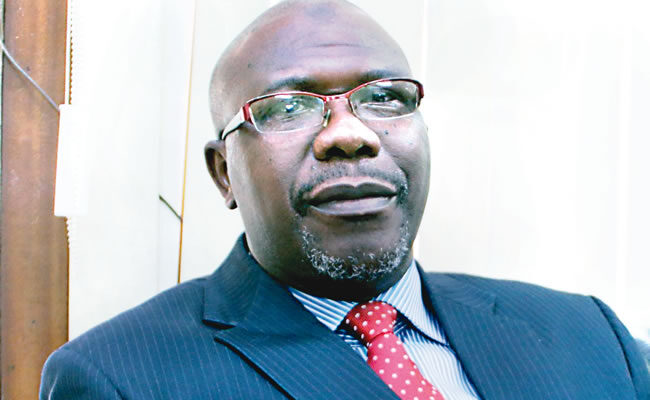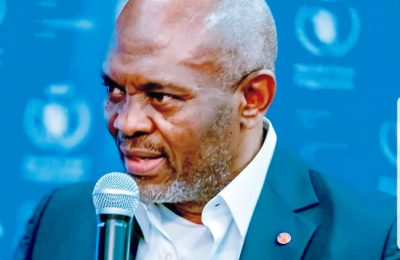
In this interview by Sade Oguntola, Director-General and Chief Executive Officer of the Nigerian Institute of Medical Research (NIMR), Professor Babatunde Lawal Salako, stressed the need for Nigeria to take a cue from developed nations by establishing health research funding council to improve its health indices and human development. Excerpts:

As part of stakeholders calling for the establishment of the Nigerian Medical Research Council, why is this important, particularly now?
The reason for campaigning for the council is that Nigeria has rather poor health indices and research has been shown to contribute to new knowledge and solution to health challenges responsible to improve these indices. All over the world, countries establish health research agencies to fund researches which eventually produce new approaches to disease management, leading to improvement in their health system. In the United States, it is called the National Institute of Health. The United Kingdom called its own Medical Research Council and in South Africa, it is called the South African Medical Research Council.
However, Nigeria, over the years, does not have a dedicated medical research funding agency, although we have a Tertiary Education Trust Fund (TETFund) that funds research generally, including education, engineering, health and so on in tertiary institutions. The health of the people often determines the prosperity of the nation. If the health system is bad and it is not delivering care and access to the population, the nation is unlikely to achieve the sustainable development goals or the universal health coverage.
All over the world, health research has contributed mostly to human development, that is why the bigger and successful nations of the world have established dedicated health research funding agencies and this is lacking in Nigeria.
Also, the fact that we don’t have it has been reflected in Nigeria’s scientists’ capacity to attract funds from competitive grants and donor sources. Such a fund would have helped with training, skills acquisition, innovation and so many other scientific breakthroughs. Building the next crop of future research leaders for Nigeria, who would then be able to take on the challenges of our health system, turn them into research ideas and come up with solutions that will bring development to the country, is important.
Most of what we have seen in the past is that funds don’t come to Nigeria; they go to other parts of Africa. If Nigeria has its own in-house fund agency, first we will be able to fund research into the diseases ravaging our country which can affect our development agenda as opposed to funding from outside being dictated by those who have the fund and, at the same time, having their own research agenda.
So, if you look at all of these, you will agree, therefore, that Nigeria needs to have a well-funded health research funding agency. Before the US established the NIH, their health indexes, compared to now, were poor. Now we all know that the US health index is better, as funding from the NIH has contributed to many research innovations, patents, discoveries, new knowledge and new approaches to treatment, including several Nobel prizes. The same goes for other countries that have established a health research funding council. Nigeria, therefore, needs to take a cue from these great countries and establish its own health research funding council, fund it heavily for steady return on investment and economic development.
Do you see the establishment of such a health research funding council helping to reverse emigration of scientists and other experts from Nigeria?
One of the reasons scientists and health professionals leave the country is that they do not have enough funding for state-of-the-art research, tools, training and an enabling research environment to be able to contribute significantly to national development. And they have to, by natural rules, find it elsewhere. Already, we do have TETFund that is doing a bit, but can still do more if more funds get to it. But a medical/health research council can concentrate on health research and, therefore, people who do health research will have another opportunity to access funds and pursue their research ideas and, of course, contribute to nation building.
By creating a medical research council, we will be able to provide a good environment for health research. We will be able to train the next crop of future Nigerian scientists and research leaders and be able to focus on our peculiar health challenges. For example, Lassa fever, for the past years, has remained without vaccine. With such a council, we can focus on that over the next few years and fund scientists to come up with novel ideas to solve the problem. There are many other diseases like that which are peculiar to our environment and nobody from outside will come and fund research to find solutions to them.
At what stage is the bill to establish medical council before the National Assembly?
The bill has been passed by the Senate. It requires the concurrence of the House of Representatives before it can be presented to the president for his assent and signature. If we miss it now, we will approach the incoming government to complete the process.
With respect to COVID-19 vaccine that NIMR is working on, how far have you gone with this?
During the active COVID-19 phase, we developed a molecule which went through animal testing. Unfortunately it did not elicit a significant immune response as we had expected. Being the first attempt ever for us, we felt encouraged and we reviewed the processes and the challenges. We went back to the laboratory to start a redesign of the vaccine. Along the line, we came together with Usmanu Danfodiyo University in Sokoto, National Veterinary Research Institute in Jos, University of Jos and the National Research Institute for Chemical Technology (NARICT) in Kaduna with funds from TETFund to develop the vaccine.
NARICT in Kaduna is to look at the adjuvants or the carrier for the vaccine that we may be able to develop. The University of Jos is to carry out the animal studies to test the vaccine while NIMR and Usmanu Danfodiyo University in Sokoto are working on the molecule that we can give to NARICT so they can add the carrier to it and then get it ready for animal studies by the University of Jos.
NIMR is currently trying to clone and purify the molecule that we have developed and Usmanu Danfodiyo University in Sokoto had completed developing its molecule. It has been presented to TETFund and they must have sent it to NICRIT for onward transmission to University of Jos by now.
Having said that, the idea of this vaccine development effort is to learn the rope to be able to begin and complete the processes within our laboratories in NIMR, Jos and Sokoto in order to be able to use the same process to develop vaccines to any emerging diseases or any current disease that requires a vaccine. It is actually not to produce active COVID vaccines for use in Nigeria now because there are vaccines already produced all over the place, it will be cheaper to just buy than trying to spend a humongous amount of money to develop another one. To develop a full vaccine is not a joke. A lot of money will be involved, and I am not sure if the government is ready for that.
For instance, as soon as we are familiar with the processes of vaccine development, we will go on to develop a vaccine for Lassa fever. That is the charge for our consortium.
But, of course, the money that we have been given appears huge but it is not enough for the work ahead. For the four or five institutions, about N450 million is given, which is really not enough to complete the process of drug development. But I must also use the opportunity to thank the current Executive Secretary of TETFund that has sustained what the immediate past Executive Secretary of TETFund had done, supporting the idea of our consortium to develop the vaccines. We hope that he will complete the funding so that we also will be able to show our efforts and our capacity and get ready for future opportunities in terms of vaccine development and production in Nigeria.
So what do we look forward to from NIMR in terms of research outcomes in 2023?
We have currently much ongoing researches as usual but some of the ones that we hope will end in 2023 include the development of a diagnostic kit for hepatitis B and viral load assessment so that physicians can use the kit to monitor patients’ response to treatment/diagnosis. Hepatitis B is a disease prevalent in Nigeria and is associated with health challenges like kidney disease and liver cancer. Of course, one of the first steps in controlling this problem is its detection.
NIMR has acquired the capacity to develop local diagnostics kits for this disease using PCR. Four years ago, our scientists spent three months in China and about six weeks in Senegal to learn pathogen identification and acquire skills to develop diagnostic kits. This is a capacity that NIMR scientists are proud of and so, we believe that we can develop using PCR and ELISA–based methods, test kits for the diagnosis of many of these diseases. For example, in the last two years, we developed test kits for Coronavirus, Lassa fever, Monkeypox and Yellow Fever. The two test kits for coronavirus have been tested and found comparable to the ones that were obtained from outside the country.
We also hope to deliver point-of-care rapid diagnostic kits that can be dipped in the urine or stool for example, to detect cholera, especially when there is an outbreak. Once you are able to detect an outbreak early, you then are able to control the spread of the disease.
Furthermore, NIMR recently discovered a new malaria vector (Anopheles Stephensi) in Gombe State. This year, we hope to map the country for this vector so that we can know exactly whether it is just in Gombe State or also in other parts of the country. It is an urban vector that is very difficult to control and it transmits plasmodium Falciparum and Vivax. Maybe it is the reason why we have been finding it difficult to control or eradicate malaria in Nigeria. We are also going to expand our effort at vaccine development for Lassa fever.
Apart from all of these, there are a number of smaller intramural and training grants to support the institute’s staff to have some preliminary evidence for larger studies within Nigeria’s research policy and priorities. For example, we are going to be looking at cervical cancer and human papillomavirus. So, a lot is in the offering from us in NIMR.
There are ongoing researches on traditional medicine especially on testing traditional herbs and preparations. Recently, we tested a coronavirus remedy developed by Afe Babalola University, Ado-Ekiti (ABUAD) and we are currently putting that report together for the university in moving forward in their plans for drug development and clinical trials. We hope to continue in 2023 to look at claims by traditional herbal practitioners, both to verify their claims and safety for the general public.
So about how many herbal remedies and preparations have been sent in to be tested?
We have received a number of them but we did not find what some of them claimed. There was a time we looked at a claim by a Nigerian scientist about a cure for AIDS that was sent by the Secretary to the Government of the Federation through the Federal Ministry of Health. We looked at it and we did not find the herbs to do what the professor claimed it does. At a point, we look at the Madagascar COVID remedy in terms of safety and possibility of being useful in COVID treatment. We are doing a lot of silent work, but we really have not had any breakthrough with these traditional medicines. But at least we are able to assess their safety because if they cannot cure, then they should do no harm. We cannot handle all the herbal medications sent for test at the NIMR because we are just using the little fund that we have for this. This is one of the reasons there should be a council that has specific funding duties, for example, to fund promising herbal medicines to be investigated further.
READ ALSO FROM NIGERIAN TRIBUNE







